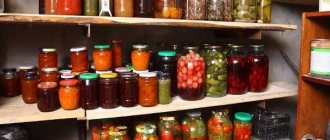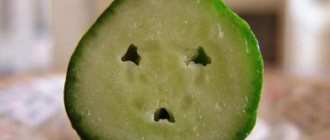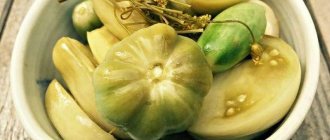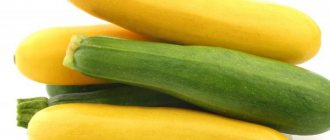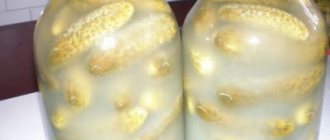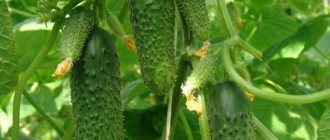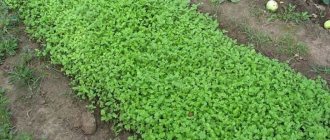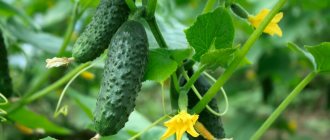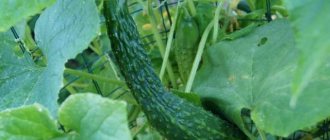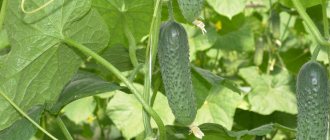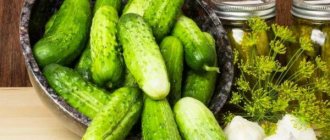Is it possible to preserve bitter cucumbers?
The bitterness in cucumbers is caused by the substance cucurbitacin. During heat treatment, it splits, and with it the unpleasant aftertaste goes away. Therefore, bitter cucumbers are not only possible, but also necessary to preserve. They acquire exactly the same taste as regular fruits. So this is the surest, and sometimes the only way to somehow preserve the harvest.
Reference . Despite its taste characteristics, cucurbitacin is considered beneficial for the human body. It has antimicrobial, anti-inflammatory and antitumor effects. Therefore, nothing bad will happen if you eat a couple of bitter cucumbers.
Why are cucumbers bitter in open ground?
Now let’s take a closer look at why bitter cucumbers grow in the garden and what measures should be taken in each case. The main reasons may be the following:
- lack of moisture and fertilizing;
- too large differences between day and night temperatures;
- “bitter” variety;
- errors in care (improper sowing, dense plantings, lack of hilling, etc.);
- pest attack.
Lack of water will affect not only the taste, but also the appearance of the fruit. It will take longer to ripen, causing the size of the greens to decrease and the skin to darken. A lack of nutrients will add to the picture an irregular shape of the fetus and a sick appearance in general. Therefore, do not pour water and fertilizers by eye; use proven dosages.
What to pour on cucumbers to prevent them from becoming bitter? First of all, warm water. It is necessary to follow the watering regime and carry out the procedure only in warm weather to avoid temperature changes.
In unfavorable weather, the beds should be covered with film or lutrasil (light non-woven material) to prevent the plants from freezing. Also, do not forget to hill up the bushes to avoid rotting of the roots, otherwise the cucumber will experience great stress.
Aphids, whiteflies, thrips, nematodes, mole crickets, spider mites and other pests can cause bitterness in cucumbers. The plant will protect itself from insect invasion and begin to produce a repellent bitter substance. Therefore, take preventive measures to protect plantings and follow the rules of agricultural technology. When planting next year, choose varieties and hybrids of cucumbers that do not taste bitter. It would also be a good idea to change the structure of the soil and increase its fertility.
- How to care for cucumbers in open ground
Have you sown cucumbers and don’t know how to care for them in the future? We'll tell you.
It is better not to apply fresh manure under the cucumbers. Give preference to well-rotted manure (humus) or bird droppings.
- How to feed cucumbers for good growth
If you do not want to use chemicals for feeding, they can be easily replaced with improvised means.
Recipes for bitter cucumber twists
Bitter fruits are preserved in the same way as regular ones. But there are a couple of nuances. Before proceeding directly to preparation, the cucumbers must be thoroughly washed and soaked for 8 hours in ice water. It is advisable to change the water every 2 hours to keep it cold. Here are examples of step-by-step recipes.
In a spicy marinade
The cucumbers according to this recipe are very sharp and crispy. You will need a three-liter jar.
Ingredients:
- 2 kg of cucumbers;
- 6 cloves of garlic;
- 30 black peppercorns;
- 3 pods of red hot pepper;
- 1 horseradish leaf;
- 3 blackcurrant leaves;
- 2 bay leaves;
- 10 coriander seeds;
- 1 sprig of tarragon;
- 1 sprig of basil;
- 3 tbsp. l. vodka;
- 1.3 liters of water;
- 75 g salt;
- 150 g sugar;
- 120 ml 9% vinegar.
Preparation:
- Wash all leaves and greens. Peel the garlic.
- Remove seeds from hot peppers.
- After 8 hours of soaking, remove the cucumbers and trim the ends.
- Place in a large colander and pour over boiling water.
- Immediately after this, pour ice water again for 2 minutes.
- Place half of all the herbs, garlic, pepper and spices on the bottom of the jar.
- Next, pack the cucumbers tightly.
- Place the other half of the spices and herbs on top.
- Boil water in a saucepan.
- Add salt and sugar to it. Cook until completely dissolved.
- Fill the jar with brine.
- Pour vinegar and vodka on top.
- Cover the jar with a lid and place in a large saucepan to sterilize.
- Boil the cucumbers in a jar for about an hour.
- Roll up.
In tomato sauce
The recipe is for 10 liters of finished product. Tomato sauce is suitable both classic and with additives.
Ingredients:
- 5 kg of cucumbers;
- 200 ml tomato sauce;
- 1.5 liters of water;
- 100 ml 9% vinegar;
- 50 ml vegetable oil;
- 100 g sand;
- 250 g onions;
- 8 cloves of garlic;
- 60 g salt;
- 5 black peppercorns;
- 5 peas of allspice;
- Bay leaf;
- dill umbrellas.
Preparation:
- Peel the onion and cut into rings.
- Grind the garlic into a paste.
- Place dill, bay leaf and garlic pulp at the bottom of the jars.
- Then place the cucumbers tightly.
- Place onion rings on top.
- Mix water, sugar and salt in a saucepan. Bring to a boil and cook until the crystals are completely dissolved.
- Finally add vinegar.
- Pour the marinade into the jars, cover with lids and place in a large container with water.
- Bring water to a boil and sterilize jars for 15 or 45 minutes, depending on the volume of containers used.
- Remove the jars, close and cool.
Spiced
You will need 12 liter jars or 4 three-liter jars.
Ingredients:
- 10 kg of cucumbers;
- 500 g sugar;
- 400 g salt;
- 250 g dill;
- 20 g mustard seeds;
- 15 g tarragon greens;
- 10 cloves of garlic;
- 10 peas of allspice;
- 15 g grated horseradish root;
- 1.4 l 9% vinegar;
- 8 liters of water.
Why do cucumbers taste bitter in a greenhouse?
The most common reason why bitter cucumbers grow in a greenhouse is the lack of regular watering. If their counterparts in the open ground can sometimes be saved by rain, then greenhouse cucumbers are completely in your power and more often experience stress from lack of moisture.
Below we list other common reasons why cucumbers are bitter and what they lack, as well as ways to eliminate the problems described.
| Causes of bitter cucumbers in the greenhouse | Remedies |
| Too little light | Install additional lighting |
| Too much light | Whitewash the walls of the greenhouse or throw white non-woven material over it |
| Lack of potassium and nitrogen | Feed the plants with potassium nitrate (20-30 g per 10 l of water) and urea (25-30 g per 10 l of water) |
| Sudden temperature changes | Ventilate the greenhouse regularly (the temperature inside should not exceed 28°C) and be sure to close it at night and on cold days |
| "Bitter" heredity | Choose cucumber hybrids that are not physiologically bitter: Gerasim F1, Egoza F1, Khorovod F1, etc. |
| Low humidity | Place a barrel of water in the greenhouse, periodically water the path, irrigate the plantings |
| Damage to cucumber vines | Install supports and tie the lashes |
| Lots of overgrown greens | Harvest every 2-3 days |
| Pest Infestation | Carry out regular inspection of plantings, remove weeds, and mulch the soil. When insects appear, spray the leaves with an infusion of tobacco dust or onion peels. |
Also regularly loosen the soil to improve its air exchange and pinch cucumber vines.
Excessive fertilizing causes enormous harm to greenhouse cucumbers, so try not to overuse them.
How to remove bitterness before preservation
If you want to preserve cucumbers without preliminary long-term heat treatment, for example, by pickling them, then you should play it safe and take measures to get rid of bitterness.
Here are some ways:
- Soaking in a salty solution can partially remove the unpleasant taste. It is advisable to cut the fruit lengthwise and cut off the bases that attach the cucumbers to the stem.
- Soak overnight in cold water. Less effective than saline solution.
- Cucurbitacin accumulates in the highest concentration at the base of the fetus. Therefore, cutting off this part and rubbing the cut area helps. During this procedure, cucurbitacin will be released from the pulp in the form of a slight foam. After rubbing, rinse the fruits.
- For maximum effect, it is better to use all methods in turn. First, soak whole fruits in cold water, then carry out the rubbing procedure and finally pour in saline solution.
Prevention methods
Proper care will provide you with a tasty harvest
A number of basic rules when growing allow you to prevent the appearance of bitterness in cucumbers and combat the loss of taste of fresh vegetables:
- It is worth choosing a planting area so that the cucumber plantings receive not direct, but diffuse sunlight;
- give preference to low-acid and neutral soils - loose soil or peat mixed with wood ash, avoiding clay soil;
- observe regular watering and use water heated to room temperature, while avoiding a lack of moisture and at the same time waterlogging of the soil;
- use mulching as a way to retain moisture in the soil;
- avoid temperature changes, including using covering material for plantings grown in open soil, using reflective films for greenhouses or painting greenhouse walls with chalk, protecting plantings from direct sunlight;
- limit the use of fresh organic matter as fertilizer, which often provokes the appearance of bitterness;
- plant varieties with the lowest content of cucurbitacin, for example, Khrustik, Egoza, Kurazh and the like.
How to get rid of bad taste
In order not to throw away the fresh harvest, but to use it for its intended purpose, you need to know how to remove the bitterness from cucumbers, because the vegetable itself is beneficial for the body.
It is enough to heat the cucumbers. In the process of pouring hot water, cucurbitacin is almost completely destroyed, and the bitterness loses its original pungency.
Where to use fresh bitter cucumbers
To be able to consume bitter cucumbers fresh, it is also advisable to soak them in water or a salty solution.
Important . Keep in mind that when soaked with salt, the fruits will acquire a corresponding salty taste.
Then you should remove the ends. The main thing is to cut off the dark green base. It has the greatest bitterness. It is also worth completely peeling the cucumbers. There is a high probability that this will completely remove the unpleasant taste.
Vinegar also has the effect of reducing the perceived bitterness. Therefore, you can prepare this salad from fresh bitter fruits: salt grated cucumbers, add ground black pepper, lemon juice, green onions and season with vinegar mixed with vegetable oil.
Spicy cucumbers
To do this you will need:
- 2.5 kilograms of cucumbers;
- 4 cloves of garlic;
- Hot pepper pod;
- 5 grams of allspice (peas);
- 4 bay leaves;
- Vinegar (9%);
- Water;
- Salt, sugar;
- A teaspoon of mustard seeds;
- Currant leaf.
Preservation is prepared as follows:
- The fruits are thoroughly washed and the ends are cut off.
- Garlic and hot pepper are chopped.
- The jar is filled with 2 peppercorns, 2 bay leaves, 2 cloves of garlic, half a teaspoon of mustard seeds, 3 pieces of chopped hot pepper.
- Place the cucumbers in a jar and pour boiling water over them for 20 minutes.
- The water from the vegetables is drained into a container, which is sent to the fire. Sugar and salt are added to it (2 tablespoons are enough for 1 liter of water).
- After the marinade boils, glass containers are filled with it.
- Vinegar is added to each jar. If its capacity is 1 liter, then 2 tablespoons of this ingredient will be enough.
- Conservation is closing. The jars are turned over and put in a dark place.
How to Prevent Bitterness When Growing
Cucurbitacin begins to be produced by the vegetable in stressful situations. These include:
- lack or excess of moisture;
- constant exposure to direct sunlight;
- lack of nitrogen and potassium fertilizing;
- watering with too cold water;
- seedling diseases;
- dense planting;
- night frosts.
In order for the harvest to be tasty, it is necessary to provide the plants with proper care: regularly water and fertilize, protect from the hot sun and weed.
The most resistant varieties of cucumbers that can withstand unfavorable conditions and do not change the taste: Ant, April, Zyatek, Ginga, Kuznechik, Masha, Gerasim, Maryina Roshcha, Kurazh, Egoza, Chistye Prudy, etc.
Unresistant varieties: Vyaznikovsky, Muromsky and Nezhinsky.
Causes of bitterness in cucumbers
The bitterness in vegetables comes from the substance cucurbitacin
, let's look at what it is. This substance is found in the peel of the vegetable, mainly at the stalk. It can be produced by vegetables from the pumpkin family.
Did you know?
Cucurbitacin is a substance that causes bitterness in vegetables, it has health benefits and absolutely no harm.
It improves the functioning of the liver and pancreas, and also helps fight malignant tumors. Cucumbers with such specific taste qualities are specially grown in some countries for medicinal purposes. When figuring out why cucumbers are bitter, you should know that the main cause of bitterness is
is cucurbitacin, which is produced in vegetables under certain conditions:
- plants are carried out with cold water;
- low amount of moisture in the soil, little watering;
- the cold weather lasted for a long time;
- excess sun rays;
- clayey;
- the soil contains little nitrogen and potassium, the soil is not fertilized;
- too fresh was used for fertilizer;
- bitter taste is inherited;
- It is believed that green varieties of cucumbers are the most bitter.
Did you know?
Thanks to research by scientists, it was found that the degree of bitterness is directly proportional to the amount of sunlight and weather conditions in general.
This is explained by the fact that the homeland of cucumbers is the Asian continent, the tropical forests of India. There, this vegetable grows in the shade of trees and is not exposed to direct sunlight, in humid conditions without sudden temperature changes. Based on this, we conclude that a vegetable that grows in unusual conditions is exposed to stress and produces cucurbitacin as a means of defense, which gives us the answer to the question of why cucumber is bitter.
Tips and tricks
To make the cucumbers crispy and the rolls to last a long time, use these recommendations:
- Before canning, prepare containers for storage: thoroughly wash jars with lids and sterilize them in any way convenient for you (in the oven, in the microwave, over steam or in boiling water).
- Use coarse salt, it reduces the risk of jars exploding.
- It is better to close the jars with a special sealing machine. This will ensure the best seal, especially if you are new to this business.
- To roll bitter cucumbers, it is necessary to carry out heat treatment before or after placing them in a jar. This will remove the unpleasant taste.
- To prepare lightly salted cucumbers, you will need to remove the skin, again, to remove the bitterness.
The benefits and harms of bitter cucumbers
In order to find out whether bitter cucumbers bring benefit or harm, you need to understand what kind of substance it is - cucurbitacin. This organic compound, obtained as a result of a plant’s “negative” reaction to poor treatment, is biologically active.
Its physiological effect is ambiguous. Currently, research is already underway on its anti-inflammatory, hepatotoxic, and antipyretic properties. It is also being seriously studied for cytotoxicity (effect at the cellular level on fast-growing tumors).
This means that in the future it will be able to be used as an antitumor agent. But there is no need to consume bitter cucumbers in huge quantities. This can lead to intestinal, pancreas and liver disorders. However, there is already evidence of many beneficial properties of this glycoside. Let's try to summarize.
Benefits of bitter cucumbers:
- The bitter fruit may have an analgesic effect. It is especially useful for pain in the abdomen, back and head, as well as for women’s monthly pain.
- Cucurbitacin may have anti-radiation effects. In places with high radiation, bitter cucumbers are recommended for consumption.
- The choleretic property that ordinary cucumbers have is also inherent in fruits with bitterness.
- Eating vegetables is beneficial for the gastrointestinal tract.
- It has a positive effect on the walls of blood vessels and the entire functioning of the cardiovascular system.
- Dried, peeled cucumber is crushed and then used as a remedy for burns and wounds.
- Bitter cucumbers slow down the development of bacteria, so they can be used for summer colds.
- Useful for diabetes.
- They slow down the development of fast-growing atypical cells (including cancer cells).
- Bitter fruits contain more antioxidants, which help our skin stay youthful longer. Their pulp is good for making masks for the face, neck, hands and feet.
Do not eat if you have:
- Stomach problems - gastritis or ulcers.
- Thyroid diseases
- Urolithiasis disease
- Kidney failure and other barrel diseases.
- Tendency to swelling during pregnancy or certain diseases.
- It cannot be transmitted without causing diarrhea. The recommended amount is no more than 3 vegetables.
- Cucumbers no larger than 10 cm should be eaten. With each additional millimeter, the benefit decreases.
Cucumbers are important and beneficial for the functioning of many systems of the human body.
Let's sum it up
Don't despair if your cucumbers are bitter. Of course, you won’t be able to eat them fresh without adding vinegar or spices, but you can preserve the bitter fruits for the winter. After undergoing soaking and heat treatment, they taste exactly the same as regular cucumbers.
It has been noticed that if sunny, hot weather lasts more than 5 days, then the number of bitter cucumbers doubles. But there are other reasons for the appearance of bitterness - for example, uneven watering or improper feeding.
We’ll tell you in the article how to correct the taste of the fruit and whether and how to preserve cucumbers with bitterness.
How to prevent bitterness
During the growth of cucumbers, it is important to control the appearance of bitterness in the fruits by mandatory adjustment of watering.
To prevent the appearance of bitterness, watering is carried out taking into account weather conditions - in hot weather the volume of water and the number of waterings are increased, carried out in the evening, and in cool weather the number of waterings is reduced.
Regular sufficient watering will prevent the appearance of bitterness in the fruits, so it is important to ensure that the soil does not dry out.
In the greenhouse, it is necessary to control the air humidity, periodically moistening it, as this can also cause the unpleasant bitter taste of cucumbers.
When collecting fruits, it is important to be careful and ensure that the plant’s vines do not twist.
Fertilizing should be carried out using potassium nitrate and complex fertilizers. It should be remembered that fertilizers can increase plant immunity and help avoid stressful situations, but their excess can also negatively affect the plant. Therefore, when using a new fertilizer, it is advisable to test it on 1–2 bushes and see their condition. And only after making sure of its effectiveness apply it to other plants.
Is it possible to get rid of bitterness or reduce it?
Cucumbers with bitterness are quite suitable for fresh use and for preservation.
How to remove bitterness from cucumbers
Bitter cucurbitacin is soluble in water, excreted in juice and concentrated mainly in the peel of the fruit. Therefore, there are several ways to remove bitterness.
Cut off the peel
Before preparing the salad, taste the cucumbers. If you feel an unpleasant bitterness, peel the fruit and use it for its intended purpose.
Removing bitterness by rubbing
Do you want to save your vitamins? Then try another way.
Trim off the ends and cut the fruit lengthwise. Rub the cuts of both halves against each other until the white foam stops coming out, then rinse the pieces under running water.
Recipe with salt
Cut the cucumber into small pieces and sprinkle with salt. Leave for about 30 minutes. The bitterness will go away along with the released juice. Rinse the slices in water and prepare the salad.
On a note! Salt the bitter cucumbers. There is absolutely no unpleasant aftertaste in this snack.
Preventing Bitterness
For those who buy cucumbers at the market or in a store, it is enough to know how to remove the bitterness from the juicy fruit. However, if you are a vegetable gardener, it is important to know how to grow a healthy, sweet cucumber.
Basic rules for growing delicious cucumbers without bitterness:
Water your bushes regularly
Use warm water for watering. Since the plants are watered in the evening, the water in the hose heats up on its own. To check if the plants have enough water, you need to dig the soil in the garden bed. It should be moistened by at least 15 cm.
Add fertilizer to the soil
Cucumbers love potassium nitrate and nitrogen. The deficiency of a particular mineral can be determined by the state of the plant. Leaves begin to curl or change color. It is better not to add manure and humus to the soil.
Particular attention should be paid to the choice of seeds
They should only be purchased from trusted places. At your request, a consultant at a seed store will advise you and help you choose a “sweet” variety. Most modern varieties contain a special gene. It prevents the accumulation of cucurbitacin in the fetus.
Growing cucumbers is a simple process, but it requires knowledge and compliance with certain rules. If you are ready to follow the recommendations of experienced gardeners, sweet, juicy cucumbers will appear on your table.
Canned cucumbers are one of the popular winter preparations, which can be prepared in a variety of ways. Spicy, sweet, sour fruits will be an ideal addition to main courses. But what to do if the harvested crop is bitter? Is it possible to preserve bitter cucumbers?
What to do when pickling
The best way to remove bitterness from large quantities of vegetables intended for pickling is to soak them in water:
- Wash the cucumbers thoroughly.
- In a suitable container, fill the fruits with cold water.
- Once every 3 hours, drain the water and add fresh water.
- After 6-7 hours, try the cucumbers. If you like the taste, start canning.
- If the bitterness remains, change the water 2-3 more times.
If it was not possible to completely rid the vegetables of bitterness, you can marinate them with spices. This will add flavor to the canned vegetables and mask any remaining bitterness.
Spicy cucumbers
For 1 kg of cucumbers you need:
- water - 1.5 l;
- sugar - 2 tbsp. l.;
- salt - 3 tbsp. l.;
- 9% table vinegar - 100 ml;
- red onion - 1 pc.;
- black peppercorns - 10 pcs.;
- green bell pepper - 1 pc.;
- garlic - 2 cloves;
- horseradish leaves - 2 pcs.;
- black currant leaves - 5 pcs.;
- dill umbrellas - 3 pcs.;
- bay leaf - to taste.
Cooking method:
- Cut off the ends of washed cucumbers.
- Peel the sweet pepper from seeds and finely chop.
- Cut the garlic into rings and the onion into half rings.
- Place washed leaves and dill on the bottom of the jar.
- Place the cucumbers tightly and add chopped peppers, onions and garlic.
- Boil water, pour cucumbers into a jar and leave for 5 minutes.
- Drain the water into the prepared pan, add black pepper, salt, sugar and vinegar.
- Boil the marinade and fill the jars to the top, roll up the lids, turn them over and cover with a blanket until they cool.
Spicy cucumbers
For 1 kg of fruit you need:
- water - 1.5 l;
- sugar - 5 tbsp. l.;
- salt - 3 tbsp. l.;
- 9% table vinegar - 100 ml;
- allspice peas - 4 pcs.;
- hot pepper - 0.5 pods;
- mustard seeds - 0.5 tsp;
- garlic - 2 cloves;
- black currant leaves - 5 pcs.;
- bay leaf - 2 pcs.
Cooking method:
- Cut off the ends of washed cucumbers.
- Finely chop the garlic and hot pepper.
- Place washed leaves, mustard, allspice, chopped garlic and hot pepper on the bottom of the jar.
- Pack the cucumbers tightly.
- Boil water, pour cucumbers into a jar and leave for 20 minutes.
- Drain the water into a saucepan, add salt and sugar.
- Boil the marinade and pour over the vegetables, pour vinegar on top.
- Roll up the lids, turn them over and cover with a blanket until cool.
Does the bitterness go away from cucumbers when preserved?
When exposed to high temperatures, cucurbitacin is destroyed. Marinating or salting in hot brine removes the bitterness from cucumbers.
Pickling recipes
The preserved recipes presented below are specially designed for bitter vegetables. They involve the use of spices and pungent ingredients. A variety of recipes allows you to prepare a snack according to your preferences.
In tomato
5 small heads
- Cut off the ends of washed fruits. Then cut the vegetables lengthwise into two or four pieces.
- Place the cucumbers in a large saucepan, add chopped garlic, paprika, granulated sugar, salt and pepper. Pour in sunflower oil and tomato. Simmer the food over low heat for half an hour.
- Pour water and vinegar into the cucumbers, then cover them with a lid and cook for another 15 minutes.
- Distribute the cucumbers into jars, fill with brine and send for sterilization.
- Using a grabber, remove the jars from the boiling water and roll up.
- Cover the workpieces with a warm blanket. Keep the finished seaming upside down until it cools completely.
Spicy cucumbers
- Leave the washed cucumbers whole, cutting off only the ends.
- Peel the bell pepper from seeds and cut into small pieces.
- Chop the horseradish root and garlic into rings, and the onion into half rings.
- Place washed dill leaves and umbrellas at the bottom of the jar. Place cucumbers tightly on top, cover with chopped pepper, onion, garlic and horseradish.
- Fill the jar with boiling water and leave for 5 minutes.
- Drain the fruit into a separate pan. Place a container of water over medium heat, add the remaining ingredients (vinegar, black pepper, sugar and salt).
- Fill the jar with vegetables and spices to the top with the boiled marinade.
- Roll up the jar, then turn it over and cover it with a blanket until it cools completely.
How to grow a sweet cucumber without bitterness
Provide the plants with comfortable conditions, and they will thank you with an abundance of sweet, aromatic fruits.
Preventing bitterness
Several recommendations will help you grow delicious cucumbers in your garden:
- plant plants in loose, fertile soil;
- do not thicken the plantings, the optimal scheme is no more than 4 bushes per 1 m2;
- bright sunlight is contraindicated for cucumbers; in a glass greenhouse, white the windows with chalk, cover the film with colored non-woven material; in open ground, natural shading will be provided by planting next to corn or sunflowers;
- water the cucumbers only with warm water;
- do not allow the soil to dry out to a depth of more than 5 cm;
- do not get carried away with nitrogen fertilizers; it is enough to apply 3 fertilizings per season - a week after planting seedlings or emergence of seedlings, during flowering and when ovaries appear en masse;
- the optimal temperature for cucumbers is up to 27 ºС during the day and 18-20 ºС at night;
- Harvest regularly - if there are old cucumbers on the bush, the ovaries slow down their growth, which contributes to the accumulation of cucurbitacin;
- choose hybrids that are not prone to bitterness.
Which cucumber hybrids are not bitter?
Breeders are working tirelessly to improve the properties of plants, and gardeners now have access to cucumber hybrids that are resistant to unfavorable conditions and do not have bitterness in the fruit.
It is worth paying attention to the following crops:
- hybrid Gerasim F1 for salad and canning purposes;
- early hybrid Garlyanda F1 that does not require pollination;
- productive early maturing hybrid Doc F1;
- Egoza F1 hybrid for universal use;
- hybrid for open ground Masha F1.
How to prevent bitter taste in cucumber fruits?
We found out why cucumbers are bitter.
What to do to prevent bitterness? Based on the reasons that affect the taste of cucumbers, you can make a list of actions that will help combat the problem:
- Choose the right place for planting so that cucumbers do not grow under the scorching sun. They need diffused sunlight. The cucumber culture feels great in the shade of rows of corn or under the branches of fruit trees. To protect from sunlight, you can use spunbond (covering material).
- Water your plants regularly. Many of us are at the dacha on weekends, so we don’t water the cucumbers every day. Alternating between drought and heavy watering stresses the plant and guarantees bitterness. Therefore, do not forget about regular watering, and use only warm water that has been warmed by the sun during the day.
- Correct placement of beds. If you grow cucumbers in open ground, do not plant them near strawberries and raspberries. These plants will draw all the nutrients and water from the soil.
- Care. It is important to constantly care for cucumbers: mulch the beds, remove weeds, loosen the soil. This helps retain moisture.
- Protect from hypothermia. If you are growing cucumbers in a greenhouse, do not open it on cold days. Such ventilation will be stressful for a heat-loving plant. In greenhouses, to protect against the cold, they use the same spunbond, which is stretched over the arcs or frame.
- Protect plants from heat. Intense heat and dry air are also detrimental to cucumbers. If the weather is hot outside, you need to water them with warm water every morning and evening. In open ground, you can use a canopy made of white material to protect from the heat. If you grow cucumbers in a greenhouse, then protect them with a mirror film, which is usually glued to glass. It transmits light on one side, but reflects it on the other.
- Do not plant seeds in clay soil. Loose soil and peat are suitable for this crop. It can be diluted with wood ash to reduce acidity.
- Fertilizers. The cucumber must receive all the nutrients it needs. Therefore, do not forget about fertilizers. But gardeners do not recommend using fresh manure, since fresh organic matter often provokes the release of bitterness. Therefore, feed the plants only with rotted manure, having prepared the beds in the fall. If you have already applied fresh manure, water the bushes constantly and make sure the soil does not dry out.
How to protect cucumbers from bitterness
Measures that can protect cucumbers from bitterness when pickling are as follows:
- When choosing cucumbers for pickling, you should avoid fruits that are overripe, yellowed, or simply large. You should also put aside cucumbers that are smooth, suitable only for salads, crooked, or have skin defects. And select young pimply cucumbers, just picked from the garden and having a length of no more than 15 cm.
- Before pickling, you need to place the cucumbers in cold water for half an hour to an hour, and if the cucumbers are not your own, but purchased, then keep them in water for 5-6 hours. As a result: elasticity will be restored, nitrates will be washed out, and bitterness will disappear.
- For pickling, use non-iodized, non-Extra, non-fine powdered salt. Only exceptionally coarse rock salt.
If you follow these rules, your pickles will never taste bitter.
Spicy cucumbers
You can adjust the proportions of ingredients for preparing such preservation, bringing it to the desired taste. If you follow the recipe given, the cucumbers will turn out spicy, but not too salty and spicy.
Required Products:
- 1 kilogram of cucumbers;
- 2 tablespoons sugar;
- 3 tablespoons salt;
- 100 milliliters of vinegar (9%);
- 1 red onion;
- 10 black peppercorns;
- Green sweet pepper pod;
- 2 cloves of garlic;
- Horseradish root;
- 2 leaves of horseradish;
- 5 currant leaves (preferably black);
- 5 dill umbrellas;
- Bay leaf.
In order to preserve delicious canned cucumbers with a spicy taste for the winter, you must follow the instructions for preparing them:
- Vegetables need to be washed well. If the fruits are bitter, they are soaked overnight in cold water.
- Sweet peppers are cleared of seeds and finely chopped.
- Horseradish root and garlic are chopped into rings, and the onion into half rings.
- Washed leaves and umbrellas of dill are placed at the bottom of the jar. Cucumbers are placed very tightly on top of them, covered with chopped pepper, onion, garlic and horseradish. The jars are filled with boiling water for 5 minutes.
- The water from the cucumbers is drained into a prepared container, which is sent to the fire. The remaining ingredients (vinegar, pepper, salt and sugar) are added to it. After boiling, the brine is poured into jars.
- The containers with spicy cucumbers are closed, turned over, and covered with a towel until they cool completely.
Cucumber varieties without bitterness
Cucumber Courage F1
Breeders have developed many hybrids and varieties that are genetically deprived of the ability to form cucurbitocin. Even if growing conditions are violated, the fruits will remain sweet.
Such varieties intended for cultivation in greenhouses are especially popular among gardeners.
- Gerasim.
A cucumber hybrid for greenhouses and greenhouses that does not require pollination by insects. The greens are small, slightly tuberculate, and have no bitterness. The plant is resistant to diseases (powdery mildew, root rot). The harvest ripens 40 days after germination and can be used for pickling pickles.
- Doc.
A hybrid with a female type of flowering, which forms a tall bush. The greens are large-tubercular, 10-12 cm long, and do not taste bitter. The hybrid is planted not only in a greenhouse, but also in open ground, as it is resistant to diseases and adverse weather conditions.
- Zyatek.
Hybrid for greenhouses, early fruiting (harvesting of the first fruits begins 40 days after germination). Productivity in protected soil is 11-12 kg per 1 sq. m. The fruits reach 10 cm in length and are used in salads and canning. Genetically devoid of bitterness.
- Courage.
Hybrid for greenhouses, recommended for cultivation throughout the country. It begins bearing fruit on the 38th day after emergence. Zelentsy are medium in size (12-16 cm), do not taste bitter or become rough. The fruits are suitable for pickling, pickling and fresh consumption.
- Chinese cucumbers.
The fruits of these plants are covered with thorns and reach a length of more than half a meter. The pulp of Chinese cucumbers never turns bitter, remaining crunchy and sweet even in overgrown specimens. The disadvantage of the fruit is its rough skin covered with sharp thorns. The fruits of Chinese cucumbers are used in salads.
When planting modern cucumber hybrids, you must remember that you cannot collect seeds from these plants. Hybrids do not pass on their qualities to their offspring.
What makes cucumbers bitter?
Cucurbitacin gives cucumbers their bitterness. Cucurbitacins belong to the class of tetracyclic triterpenoids and represent a whole group of substances similar in structure, each of which, in addition to the main name, received an additional Latin letter from A to R. In plants, cucurbitacins are contained in the form of glycosides, which, under the action of the enzyme elastase, break down into free cucurbitacin and sugar.
All cultivated cucumbers contain cucurbitacin B and cucurbitacin C, toxic organic compounds that should make their leaves bitter and less palatable to leaf-eating insects and animals. In addition, cucurbitacin increases the germination rate and rate of seed germination, as well as the crop’s resistance to stress. These compounds are usually concentrated in the leaves, stems and roots, parts of the plant that people don't eat, so we don't know they're there. Only when they pass into the greens themselves do we begin to feel the bitter taste, although sweet cucumbers also contain this substance, but in minimal quantities. Because of this feature, in the 18th century, cucumbers were even considered poisonous and were not eaten. Usually not all of the cucumber becomes bitter. Most often, the bitterness will be concentrated at the tips and the area just under the skin.
Note that today cucumber, on the contrary, is considered a medicinal plant precisely due to the content of cucurbitacin. Cucumber helps improve liver and intestinal function and reduces the risk of malignant tumors. Scientific research conducted in different countries of the world since the second half of the twentieth century has proven that cucurbitacins have a wide range of very important biological properties, such as antitumor, contraceptive, anti-inflammatory, antimicrobial, anthelmintic, etc. However, official medicine is not yet ready to call us as prevention or, especially, treatment of serious diseases, eat bitter cucumbers.
Few people know that not only cucumbers, but also many other plants are protected from being eaten by animals using similar mechanisms. For example, plants of such tasty melons as pumpkin, melon or watermelon contain saponin - an organic compound with a bitter taste, related to cucurbitacin. The name of the pumpkin family itself comes from the Latin name for pumpkin - Cucurbita pepo. Moreover, these substances contain not only food, but also non-food representatives of this family, for example, white steppe, also known as white bryonia (Bryonia alba), mad cucumber, or echinocystis lobed (Ecballium elaterium), etc., as well as representatives of others families, for example, Elaeocarpus hainanensis, etc.
Unripe fruits and overripe specimens growing in unfavorable conditions, as well as those vegetables that grew from the seeds of bitter cucumbers, are most prone to bitterness. Therefore, when planting, choose varieties and hybrids that are resistant to bitterness and be very careful when selecting specimens for collecting seeds yourself.
To the question - what is wrong with the plant, as always, there is no definite answer. But this is what makes gardening and gardening so interesting!
There is no consensus on what causes strong bitterness in cucumber fruits, but all experts agree that the culprit for this offensive phenomenon is one or another type of stress that the plant experiences during growth. Unfortunately, we cannot tell if our cucumber is becoming bitter while it is still growing. But while we can't fix the problem before it happens, we can try to avoid the growing conditions that are potential culprits for bitter-tasting cucumbers in the future and try to produce a bountiful harvest of great-tasting cucumbers.
Cucumbers marinated with Makheev chili ketchup: recipe
This is not to say that this recipe is quick to prepare, but the end result will more than justify all your efforts. The cucumbers turn out to be unusually crispy, moderately spicy and very piquant in taste.
Ingredients for 2 liter jars:
- Young cucumbers (small) - 2 kg
- Currant leaves (black) - 8 pcs.
- Allspice - 12 peas
- Fresh horseradish root - 1 pc.
- Bay leaf - 2 pcs.
- Dill umbrella - 2 pcs.
- Dry mustard powder - 1 tsp.
For the marinade we use:
- 9% vinegar - 100 ml
- Ketchup “Chili” (Makheev) -150 g
- Water - 0.5-0.7 l
- Sugar - 1/2 tbsp.
- Salt - 1 tbsp. l.
Technological process:
- We wash the vegetables and soak them in cold water for 2-3 hours.
- Place all the specified spices in a sterilized glass container.
- Place cucumbers tightly on top
- Boil the marinade from all the above ingredients for 2-3 minutes.
- Fill them with jars of cucumbers
- We send the workpieces to sterilize in a water bath for 25 minutes
- Then we roll up the jars
- Turn the lid down
- After cooling, put into cool storage
If lightly salted cucumbers are not salted, what should you do? 7 tips for properly pickling cucumbers
1. For salting, use non-iodized salt - only sea or coarse rock salt. Depending on the size of the cucumbers, the salt concentration is different: 8-9% solution for large fruits (more than 10-11 cm long), 7-8% for medium-fruited cucumbers (up to 10-11 cm) and 6-7% for small cucumbers (7-8 cm). The concentration of the saline solution also depends on the desired storage time. The longer we want to have pickles in our bins, the higher the percentage of salt.
Pickled cucumbers with dill and horseradish leaves (see recipe here)
2. When pickling, do not forget to add: dill (seeds and stems), horseradish, garlic, blackcurrant leaves, oak leaves, cherry leaves, tarragon, parsley, celery, wild garlic, thyme, mustard beans, bay leaf, etc. Amount of spices and spices should not exceed approximately 5% of the total weight of cucumbers. The amount of garlic should not be more than 10-15 g per 1 kg of cucumbers, unless you plan to salt and garlic in the same jar.
Pickling cucumbers with rye bread (see recipe here)
Sugar is often added to the brine solution at the rate of 8-10 g per 1 kg of cucumbers. This is especially useful if the summer was cloudy and the cucumbers ripened at an insufficiently high temperature. Sugar can also save the situation if you salt slightly wilted or large fruits (from 11 cm).
Barrel pickles (see recipe here)
3. Cucumbers for pickling must be selected and ripe. This is the most important condition. Be sure to sort them by size. There is a simple way to determine which fruits are recommended for pickling: look at the top of the cucumber (this is where the cucumber had a tail). If the surface is ribbed and there are more than 4 “edges”, this is a pickling variety. If it is smaller or the surface is smooth – lettuce. This is how my mother and grandmother chose cucumbers, this is what I do, and this is what my children do.
An example of fresh cucumbers for pickling (ribbed and pimpled)
Fruits, which have a dense skin and a smooth surface, do not allow the salt solution to pass through easily, and are often salted unevenly. But pimply cucumbers for pickling are just the thing!
Cabbage salad with beets and pickles (see recipe here)
4. Use hard water for pickling, this will make the cucumbers crispier. And pay attention to the phase of the moon. Cucumbers salted on the full moon and in the days preceding it turn out soft and “empty.” The best phase for salting is the first week after the new moon. The same rule exists for preparing sauerkraut. This, of course, is very subjective, but, in my opinion, there should be a little miracle and faith in the powers of earth and sky in cooking.
Sandwich Three cucumbers on Borodino bread (see recipe here)
5. It is best to pickle cucumbers in oak (they absorb less moisture and are very practical) or birch barrels. Line the tub with a clean towel, and be sure to place a press made of oak planks and a weight on top (on the cucumbers). The cucumbers must be completely immersed in the solution, otherwise they will darken and salt unevenly. The load should not put too much pressure on the cucumbers.
Beef kidneys with mushrooms and pickles in sour cream sauce (see recipe here)
6. Before pickling, if you are not entirely sure of the quality of the cucumbers, soak them in clean water for 4-8 hours. Pickle cucumbers from your own garden directly on the day of collection.
Appetizer of rye bread with pickles (see recipe here)
7. When pickling in open barrels, add 30 g of freshly ground black (French) mustard, placed in a linen bag, into the brine. Then mold will definitely not appear.
Which varieties are not bitter?
In different types of cucumbers, the level of cucurbitacin differs . The most bitter varieties have a characteristic cucumber taste. Hybrids contain minimal amounts of cucurbitacin, also in self-pollinated varieties for greenhouse conditions.
It is advisable to buy varieties marked F1 . These include the species Gerasim, Garland, Doka, Egoza, Mumu, Round Dance, Zabiyaka, Liliput. Sometimes manufacturers immediately mark the packs with information that the variety is without bitterness. When non-hybrid varieties are used for sowing, it is important to provide them with irrigation with warm water and abundant fertilizers.
Why do cucumbers grow bitter: the main reasons
Cucumbers are one of the most popular vegetable crops belonging to the pumpkin family. All representatives of this family have one genetic feature - they contain cucurbitacin. It is found in stems, leaves, and fruits. Cucurbitacin is a toxic compound, although it has a number of beneficial properties (anti-inflammatory, antitumor, antimicrobial). The production of this substance is a protective reaction of the plant. Cucurbitacin imparts a bitter taste, which repels animals. Many members of the pumpkin family lose their bitterness over time, but cucumbers can taste bitter even after they are fully ripe.
Under normal conditions, cucurbitacin is produced in small quantities. Under the influence of stress, its production increases, and this is reflected in taste. Stress in a plant is caused by lack of care, unfavorable weather conditions, and the wrong choice of place for growing. Factors that provoke the appearance of a bitter taste in cucumbers include:
- very abundant or, conversely, rare, as well as irregular watering;
- watering with cold water;
- excess sunlight (exposure to direct sunlight);
- lack of sunlight (dense plantings, lack of canes formation);
- lack of nutrition (primarily lack of potassium and phosphorus fertilizers).
A bitter taste may appear due to improper watering.
Cucurbitacin is produced intensively when plants are overstressed. Scientists were able to establish that 9 genes are responsible for the production of a protective substance. All these genes have been isolated, and new cucumber hybrids do not contain them. Such fruits are genetically free from bitterness, so the taste remains high, even if the plants were sick, did not receive enough moisture, nutrition, or were stressed.
